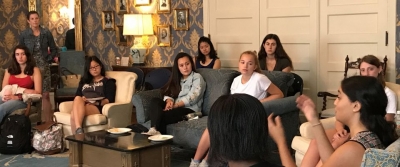
Written by: Cameron Wu

Established in 1983, the Duke Gender, Sexuality, and Feminist (GSF) Studies Department (formerly “Women’s Studies”) is dedicated to “transforming the university’s organization of knowledge” through an interdisciplinary and intersectional approach to studying gender identities, relations, practices, theories, and institutions.
However, the small proportion of students participating in this program suggests that GSF classes are simply not a priority for many Duke students. These classes not only enlighten, but also empower students with analytical and critical thinking skills that extend to any profession.
Here are just three reasons why you should consider taking a GSF class at Duke:
The vast majority of what we learn about at Duke, from academic literature, historical narratives, textbooks to case studies, was written by straight men. Not only that, but most of the faces we see in textbooks, faculty positions, and university leadership are male. As such, more diverse classes that actively value everyone’s voices and do not tokenize underrepresented groups are an asset to our educations.
Investing time into understanding narratives from women and LGBTQ+ leaders provides us with crucial insights into their experiences and thought processes. Often times, we tend to dismiss the voices of minorities due to a “lack” of academic resources and historical evidence—but this assumption is far from the truth.
According to Dr. Laura Edwards, Peabody Family Professor of History and Gender, Sexuality, and Feminist Studies, “women have always acted—but the culture tends to constrain them and obscure their actions.” Thus, she continues, GSF classes give these women agency and the ability to articulate their voices to contemporary audiences. Current movements advocating for GSF studies are not the root of the academic discipline, but a result of people paying attention to the voices of historically oppressed groups. Consequently, studying diverse perspectives enables us to think outside traditional gender binaries and move forward as more mindful individuals.
Representation undoubtedly has powerful effects on people. Recently, reporters and audiences praised movies such as Black Panther and Crazy Rich Asians for providing platforms for African Americans and Asian Americans to see themselves represented in popular culture. Extending this intentional form of representation to the classroom empowers students whose cultures and identities are not mandatory curriculums. Learning that your experiences as part of a minority are not only valid but relevant and meaningful for people to study is a powerful way to build your own self-confidence and realize that your experiences don’t make you an outsider. Rather, they make you a member of a community.
According to a 2016 study, 90% of surveyed women believed that female representation was important, and 58% reported having a female role model who inspired them to be more ambitious or assertive. Representation not only encourages people to seek opportunities that they didn’t know they had, but it also empowers them to pursue avenues for attaining those goals. Similarly, diversifying teaching materials and subjects allows people to identify with leaders and role models and feel included in classroom discussions.
GSF classes prepare us to confront class discussions, social issues, and workplace interactions with a more thoughtful and critical lens. When problems arise, how are gender dynamics affecting communication and outcomes? To what extent are people of minority groups intentionally included and valued in professional spaces? GSF classes teach us how to approach our lives in a holistic, intersectional fashion. For women and LGBTQ+-identified individuals, GSF studies can help them feel more confident asserting their opinions and experiences. For those who don’t necessarily identify with those groups, these classes can help them gain a greater understanding and appreciation for others’ perspectives. Ultimately, GSF courses help people to become advocates for social change not only in terms of dialogue but also in terms of actionable, sustainable practices that can be carried across academic and social disciplines.
Whether you’re looking for an interesting class to take next semester or considering a GSF degree, GSF classes provide invaluable knowledge and insights that are relevant to everyone. GSF classes not only teach contextualization and critical thinking skills, but also what it means to have an open mind and enter critical conversations.
Article from the MUSE - Feminism at Duke